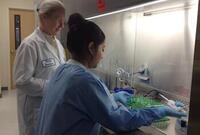TURI Awards $78K in Academic Grants
TURI has awarded four grants to UMass Lowell faculty to conduct research that identifies and tests less hazardous substances used in resins, nail polish, disinfectants and photovoltaics processing.
“Our faculty are leading the way in development of more environmentally-friendly substances that perform as well as, or better, than toxic substances,” says Pam Eliason, industry and research program manager.
This year's projects and grant recipients include:
- Resins – Asst. Prof. Chris Hansen of Mechanical Engineering will investigate safe alternative chemistries to replace styrene monomer used to manufacture unsaturated polyester resins found in products such as bowling balls and wind turbines. Styrene is the most used toxic chemical in Massachusetts.
- Nail polish – Asst. Prof. Emmanuelle Reynaud of Mechanical Engineering and Assoc. Prof. Daniel Schmidt of Plastics Engineering will develop an alternative to nail polish made from safer thiol-ene chemistry and compare the performance to nail polish that contains toxics such as toluene, formaldehyde and phthalates. They will also work with state and federal organizations to promote safer nail salons.
- Disinfection – Asst. Prof. Nancy Goodyear of Clinical Laboratories and Nutritional Sciences will conduct performance testing of safer disinfection formulations and test meters that detect residual organisms. This work will be done in collaboration with UMass Lowell facilities and the Montachusett Opportunity Council.
- Photovoltaics – Asst. Prof. Meg Sobkowicz-Kline of Plastics Engineering will study safer processes for manufacturing conducting polymers that are used in many applications including organic photovoltaics and thin film transistors.
TURI’s research program connects the challenges currently facing industry with the expertise and innovation present at the University.
Merely writing the grant proposal helped Hansen think about the benefits of reducing toxics use at the source.
“Applying for the TURI grant has been a valuable catalyst for our research group to re-think the adverse respiratory effects associated with using typical composite materials,” he says. “Previously, we would rely on engineered controls like ventilation to divert the noxious vapors associated with resin use. Now we have an opportunity to identify safer chemical alternatives, and then implement them in coordination with Massachusetts-based industrial partners so that the use of toxic chemicals can be avoided at the outset.”
